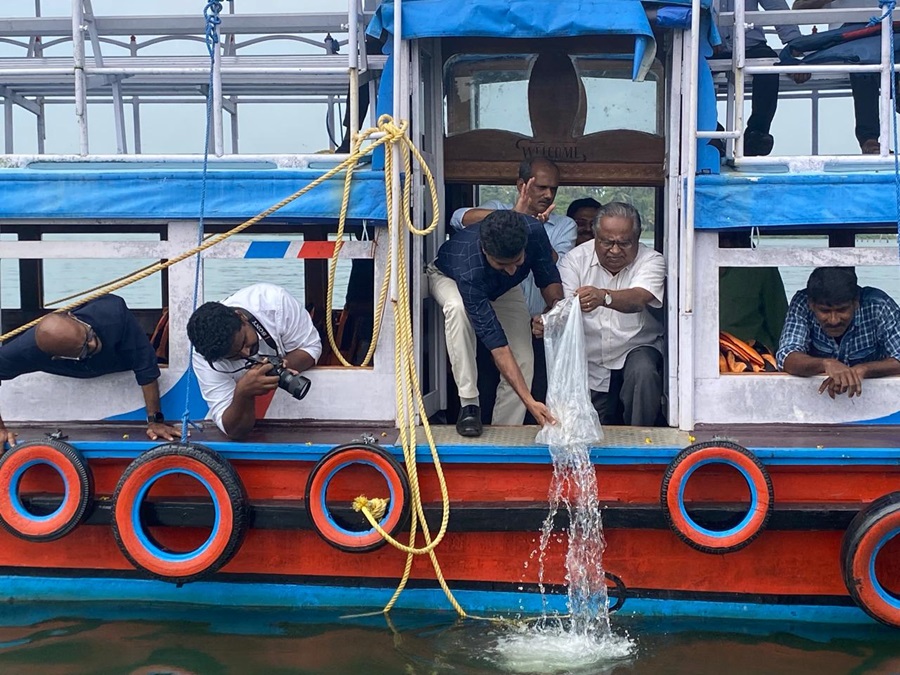

KOCHI:
In a major step to address the alarming decline in the short neck clam population, the ICAR-Central Marine Fisheries Research Institute (CMFRI) has launched a stock enhancement programme by releasing the clam seeds into Ashtamudi Lake. Three million seeds of short neck clam (Paphia malabarica) produced in the hatchery of Vizhinjam Regional Centre of CMFRI were released on Tuesday into Ashtamudi Lake, where depletion of this species has been reported.
The ranching is a sustainable solution by replenishing the clam stocks and ensuring the continuity of this critical resource in the backwaters. The initiative was part of the Pradhan Mantri Matsya Smpada Yojana (PMMSY) Blue Growth Project. It is aimed to restore the clam stocks, ensure sustainability, support local fishermen and provide leverage for boosting export revenues.
Seeds were stocked in two designated areas in the Lake: Bishop Thuruthu demarcated as clam sanctuary and Valam Ansil Thuruth. The stock enhancement programme was made possible after CMFRI’s year-long research efforts led to the successful development of captive breeding technology for this clam species, enabling the production of seeds for the release.
Short neck clam is a treasured resource in Ashtamudi Lake with significant economic and ecological importance. “However, in recent years, the fishery of this clam has witnessed a drastic decline, threatening the livelihoods of thousands of fishermen who rely on this resource”, said M K Anil, Principal Scientist at Vizhinjam Regional Centre of CMFRI.
According to CMFRI estimates, recent annual catches have fallen below 1,000 tonnes as against 10,000 tonnes during the early 1990s. This clam species has substantial export potential, as international demand for clams continues to rise, offering significant economic opportunities for local communities.
CMFRI scientists pointed out that key issues such as environmental pollution, invasion of non-native species like the Charru mussel, and the impacts of climate change, including altered salinity and water temperature, have significantly reduced the clam population.
The event also witnessed the launch of hatchery facilities to produce bivalves for enhancing sustainable aquaculture practices and meeting the growing demand for high-quality seeds. Mussel seeds were distributed to local farmers, providing them with resources to strengthen their aquaculture operations and improve their livelihoods.
CMFRI Vizhinjam Regional Centre Head Dr B Santhosh; Principal Scientists Dr Anil MK and Dr Imelda Joseph; Fisheries Joint Director H Salim; Fisheries Deputy Director Ramesh Sasidharan; CMFRI former Principal Scientist Dr Appukuttan K K and Scientist Gomathi P spoke on the occasion.
more recommended stories
PALAKKAD:Kerala is all set to launch.
KOCHI:Kerala marked a major stride in.
KOCHI:Kerala Co-operative Milk Marketing Federation (Milma).
KOCHI:The ICAR-Central Marine Fisheries Research Institute.
THIRUVANANTHAPURAM:Noting that the cooperative model has.
TIKARIA (UP):ACC, the cement and building.
KOCHI:Milma’s Ernakulam Regional Cooperative Milk Producers’.
NEW DELHI:Meghalaya, renowned for its verdant.
THRISSUR:The stakeholders of Kerala Feeds Ltd.
KOCHI:Milma’s Ernakulam Regional Cooperative Milk Producers’.